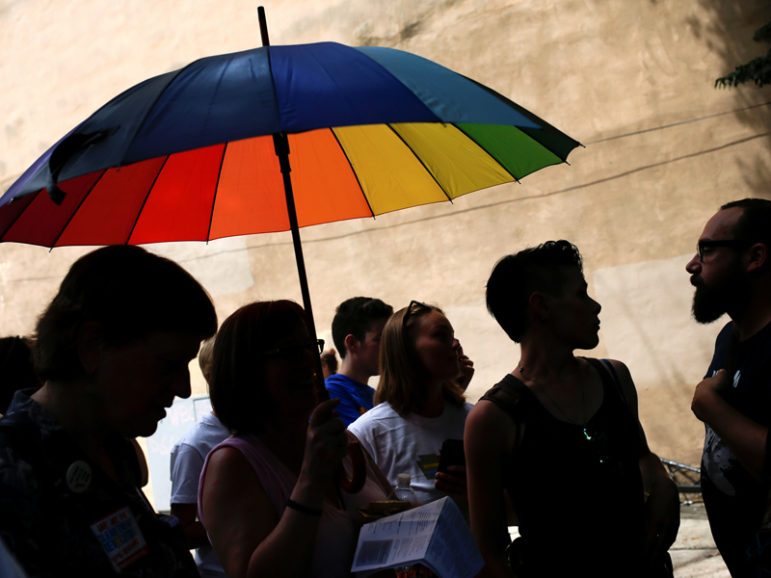(RNS) Middle ground is disappearing on the question of whether LGBT persons should be treated as full equals, without any discrimination in society — and on the related question of whether religious institutions should be allowed to continue discriminating due to their doctrinal beliefs.
It turns out that you are either for full and unequivocal social and legal equality for LGBT people, or you are against it, and your answer will at some point be revealed. This is true both for individuals and for institutions.
Neutrality is not an option. Neither is polite half-acceptance. Nor is avoiding the subject. Hide as you might, the issue will come and find you.
This is a substantial change. The landscape is dramatically different even from when I began working on my book on this subject in the summer of 2014.
Legal changes are certainly playing a role. The 2015 Supreme Court decision mandating recognition of gay marriage in all 50 states was obviously important.
But most visible institutions of American life had abandoned discrimination against LGBT people before that. Today, these same groups are increasingly intolerant of any remaining discrimination, or even any effort to stay in a neutral middle ground. As with the fight against racial discrimination in the 1960s and 1970s, sexual-orientation and gender-identity discrimination is rapidly being rejected by society.
Institutions where full LGBT equality is mandatory now include any entity associated with the federal government, including the military and the civil service.
And the vast majority of the education sector, its schools, trade groups, accreditors and staff, both because of the values of most educators and because of federal regulations.
And most clinical, medical and helping professions, associations and leaders.
And most titans of corporate America.
And most of the media and entertainment business, including its most visible celebrities.
And most of the nonprofit and civil society sector, including former longtime holdouts like the Boy Scouts.
And most of the sports world, including its famous athletes.
And many state and local governments and their leaders.
And the vast majority of America’s secularists; minorities in many other American religious communities; and majorities in some of these religious communities.
Over against this sweeping trend in favor of full LGBT equality and nondiscrimination stand America’s most conservative religious communities and their leaders, together with localities and states most affected by such conservative religiosity, and a weakening but still powerful contingent of activists, lobbyists and Republican Party stalwarts.
I have been a participant in the effort to encourage Protestant religious conservatives, generally known as fundamentalists and evangelicals, to reconsider their position voluntarily. The same conversation is happening in almost every U.S. religious community.
The most receptive are those who have personal skin in the game; that is, LGBT people raised in conservative religious families and churches, and the friends and family members and leaders who love them.
Experiencing the suffering oneself — or a loved one’s or a parishioner’s — is the major path into theological reconsideration. Many have found their way to a new view along this path. But many remain closed.
Indeed, as of now, the majority of conservative religious institutions, including congregations, denominations, publishers, parachurch organizations and colleges, are responding to today’s sweeping social changes by digging in their heels — even against profound and pained internal opposition from their own dissenters.
These institutions and their leaders are interpreting pressure to reconsider as pressure to succumb to error, or even heresy.
They are interpreting social changes toward nondiscrimination as mere embrace of sexual libertinism.
They are attempting to tighten doctrinal statements in order to tamp down dissent or drive out dissenters.
They are organizing legal defense efforts under the guise of religious liberty, and interpreting their plight as religious persecution.
They are confident that they have the moral high ground, and from their remaining, shrinking spaces of power they still try to punish those who stray from orthodoxy as they understand it.
Surely the events of this political year offer this contingent no comfort.
GOP primary voters had at least a half-dozen conservative religious candidates to choose from, but instead picked Donald Trump.
Marking their continued influence, the GOP platform retained all the old anti-gay boilerplate. But openly gay speaker Peter Thiel received a warm embrace, and Trump himself spoke in defense of LGBT people.
On the Democratic side, not only is LGBT equality now doctrine, sympathy for religious liberty exceptions is drying up quickly. If Hillary Clinton is elected president, making for 12 to 16 straight years of Democratic control of the White House, it is quite possible that by Supreme Court ruling and federal regulation any kind of discrimination against gay people will have the same legal rights and social acceptance as any kind of racial discrimination. Which is, none.
Openly discriminatory religious schools and parachurch organizations will feel the pinch first. Any entity that requires government accreditation or touches government dollars will be in the immediate line of fire. Some organizations will face the choice either to abandon discriminatory policies or risk potential closure. Others will simply face increasing social marginalization.
A vast host of neutralist, avoidist or de facto discriminatory institutions and individuals will also find that they can no longer finesse the LGBT issue. Space for neutrality or “mild” discrimination will close up as well.
Sometimes society changes and it marks decadence. Other times society changes and it marks progress. Those who believe LGBT equality marks decadence are being left behind.





